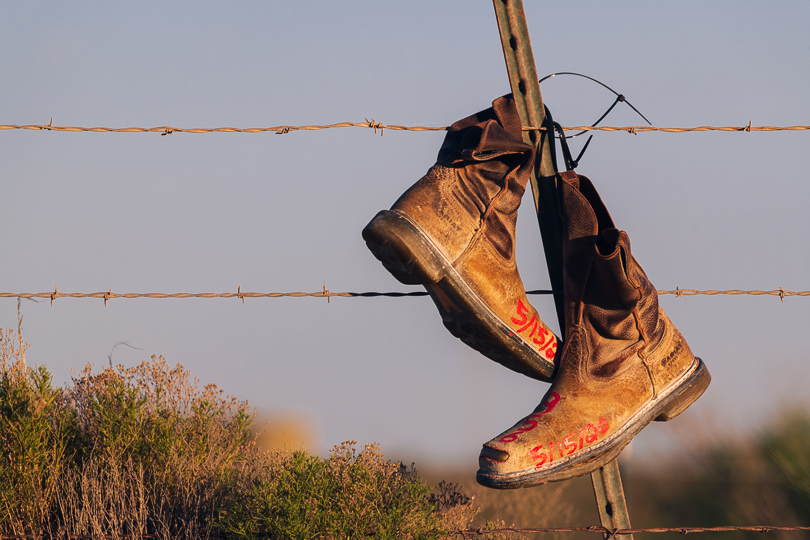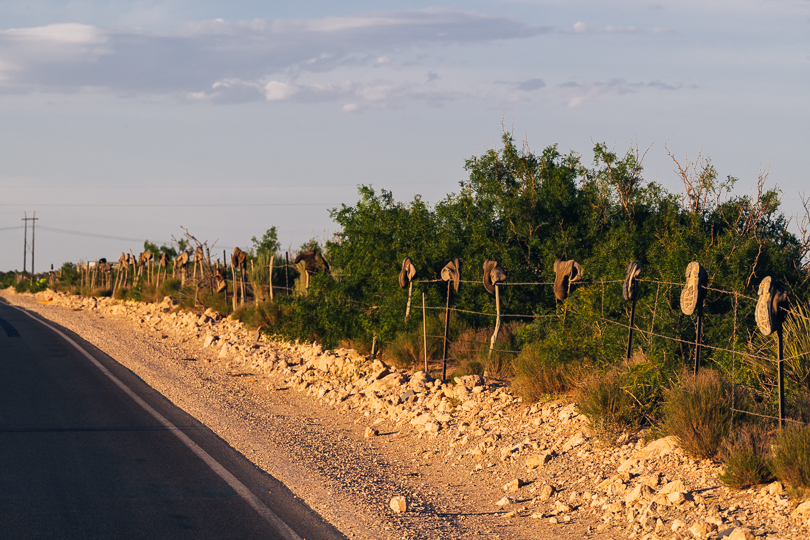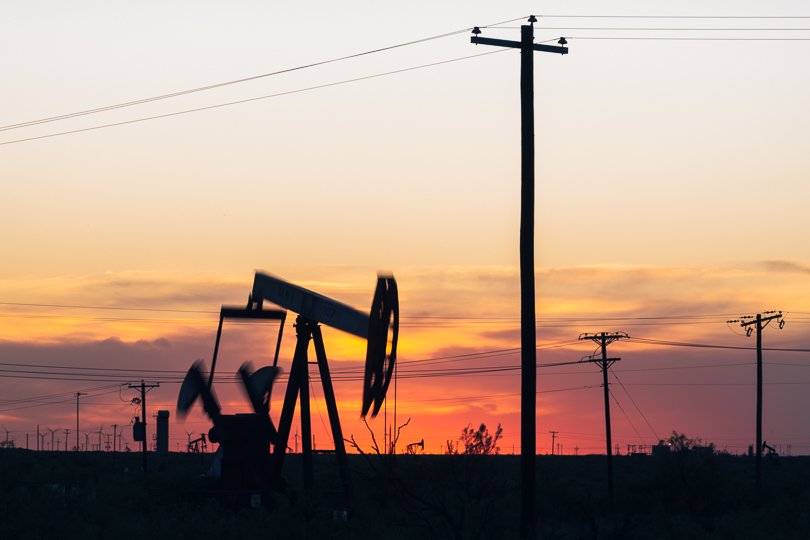Yesterday, President Trump left Midland, Texas, after arriving in the state’s Permian oilfield region for a $2,800 a plate luncheon and a “roundtable” that required each participant to pony up $100,000.
The west Texas Mr. Trump left behind bears little resemblance to the region as it was when he first took office in January 2017, as the shale rush resumed following 2016’s oil price plunge.
Today, the shale boom of the 2010’s is officially bust, battered not only by the US’s outsized failure to control COVID-19 outbreaks and an oil price war in which foreign producers proved their ability to steer oil prices, but also a wave of multi-billion dollar write-downs by oil giants — write-downs that predated both the price war and the pandemic and resulted from the industry’s perpetual struggles to generate profits from shale drilling and fracking regardless of the price of oil.
Last Friday, just 103 active drilling rigs dotted Texas, according to data from Baker Hughes. That’s down from 403 drilling rigs as 2020 began and the state’s peak this decade of 930. Just 251 active oil and gas rigs could be found across the entire United States, the lowest number recorded since Baker Hughes began tracking the rig count back in 1940.
In late February, the nighttime horizons around Midland and Odessa were still dotted with brightly burning oil well flares, dozens of flickering licks of flame that cast an uncertain light across the mesquite and cotton fields of west Texas. Mancamps and hotels already appeared partially emptied out, even while a constant flow of truck traffic streamed along the desert highways.
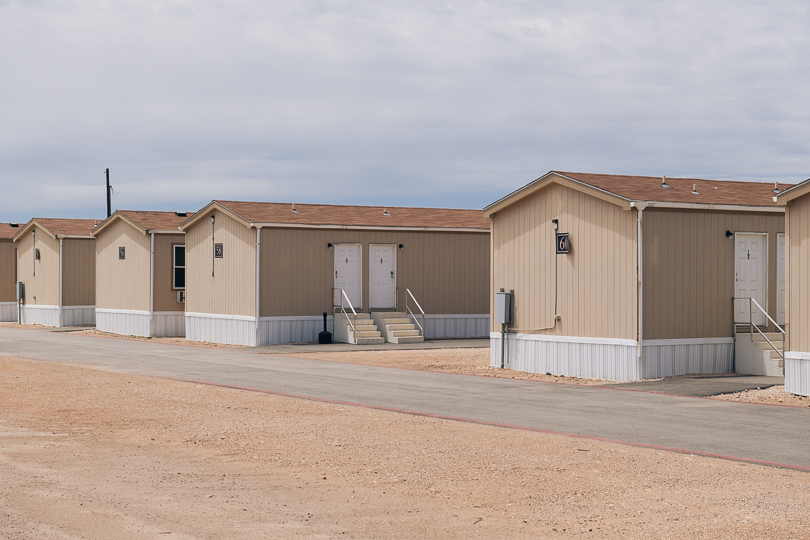
Empty worker housing at FTSI in Odessa, Texas. May 27, 2020. Credit: ©2020 Justin Hamel
In May, that truck traffic had all but disappeared. Instead of flares, the Permian basin’s emptied highways were lined with abandoned work boots and gloves, hung up on barbed wire fence post in an oilfield memorial for jobs lost to layoffs and bankruptcies. Mothballed drilling rigs and frac sand dispensers overflowed from parking lots into the surrounding dirt fields.
Laid off workers boots hung on fence posts after their last shift in the oil fields. Eddy County, New Mexico. May 27, 2020. Credit: ©2020 Justin Hamel
“On Friday, Exxon is expected to report a $2.63 billion second-quarter loss, according to Refinitiv Eikon data, on sharply lower prices and weaker production, the first back-to-back quarterly losses in at least 36 years,” Reuters reported today. “Rivals BP Plc, Royal Dutch Shell and Total have slashed up to $45 billion in the combined value of their oil and gas properties.”
Anyone who’s spent a long enough time in the oil industry, particularly in Texas, has seen oil booms and busts before. But this year’s collapse, according to industry insiders, has the potential to forever break that cycle — not because the boom days are here to stay, but because it’s possible that oil may never make a full comeback.
“I believe it is likely to assume that demand will take a long time to recover,” Shell CEO Ben van Beurden said today as he announced his company’s second quarter loss, an unprecedented $18.38 billion, “if it recovers at all.”
‘We Have All Destroyed Capital’
In April, Scott Sheffield, the chief executive of Pioneer Natural Resources, testified before the Texas Railroad Commission (which serves as the state’s oil regulator) that the shale rush had been “an economic disaster.”
“Nobody wants to give us capital because we have all destroyed capital and created economic waste,” Sheffield testified, warning that without state intervention, “we will disappear as an industry, like the coal industry.”
Indeed, before the pandemic struck, the shale industry’s financial foundations were stunningly shaky, with experts questioning the ways companies calculated their reserves, their ability to generate free cash flow from their drilling operations, and ratings agencies grading shale debts at junk levels. The entire fossil fuel industry’s long-term future is also deeply uncertain, as the impacts of climate change become increasingly visceral and the global need to cut emissions from oil and gas more urgent.
Pump jacks on the setting sun, with windmills in background. Ector County, Texas. May 28, 2020. Credit: ©2020 Justin Hamel
It’s not at all clear what the COVID-19 pandemic will mean for energy use or greenhouse gas pollution worldwide. Before the pandemic, the oil and gas industry worldwide was just beginning to face real competition from cheaper non-fossil fuel-based energy sources, and renewable energy groups are now working hard to promote their inclusion in recovery plans.
While most of the decline in driving due to shelter-in-place orders is expected to be temporary, an analysis this month by KPMG International predicts a 10 percent permanent reduction in US miles driven per year. More people worldwide are also buying and driving electric vehicles. “The shift towards sustainability is the driving force behind the electrification of transport,” Ram Chandrasekaran, a Wood Mackenzie analyst said in an April statement. “Uncertainty caused by the oil price war and global catastrophes will only serve to strengthen that resolve, not deter it.”
Ups and Downs
To be sure, Texas has seen oil busts before.
“The fabled [early] eighties collapse—a 60 percent drop over sixteen months, from 4,530 rigs to 1,807—was the most dramatic in rig-count history,” Texas Monthly reported in 1986, amid yet another historic oil price plunge. “But it was not the largest. The record, set in 1971, is a decline of 74 percent after a fifteen-year slide to 814 rigs.”
But this year’s collapse has been extraordinary, both before and after the pandemic. It took just one year, from last July to this month, to replicate that 74 percent slide. Today, Shell announced a $16.8 billion impairment charge for the second quarter of 2020.
A less wild future for the oil industry has been predicted countless times before.
“Oil’s Boom-and-Bust Cycle May Be Over,” a Harvard Business Review headline proclaimed just two and a half years ago. The authors credited shale drillers with ensuring that oil prices would stay relatively steady. “Unlike national oil companies and oil majors that typically take five to 10 years to develop conventional oil reserves,” four partners at management consulting firm Oliver Wyman wrote, “these independent and ‘unconventional’ players have improved their drilling and fracturing technology to the point where they can respond within months to temporary spikes or dips in the market.”
That proved to be an ill-fated prediction. In the two and a half years since, the price of a barrel of West Texas Intermediate oil has hit highs over $75 a barrel and plunged to negative $37 — a stunning and unprecedented drop below zero dollars a barrel.
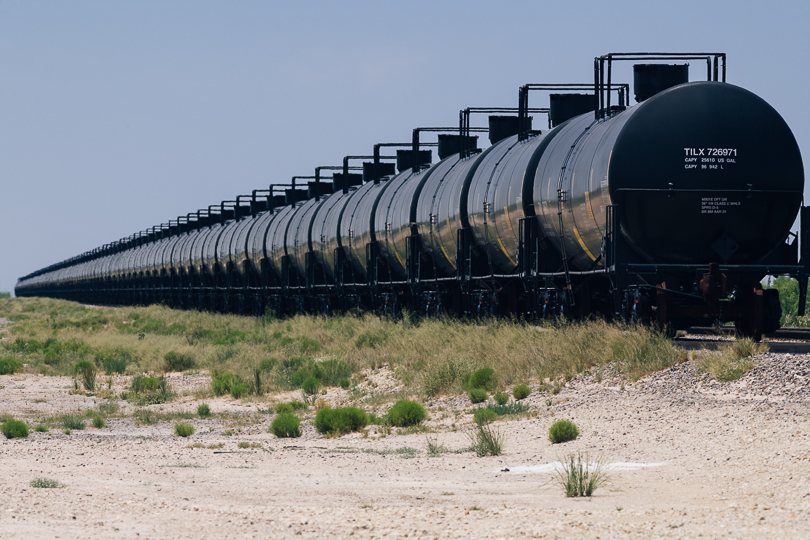
Oil tankers sit on a siding outside of Monahans, Texas. May 27, 2020. Credit: ©2020 Justin Hamel
“We’ve had our ups and downs, even over the last 20 years, but this feels very different,” Matthew Hale, president of S.O.C. Industries, a Permian trucking and chemical services firm, told The New York Times.
More than 200 North American oil explorers have gone belly up since 2015, leaving behind over $130 billion in debt. “Profitability and shareholder returns have been consistently disappointing, and investors had already grown wary of throwing more money into shale before this year’s oil crash,” Bloomberg reported in a June profile of bankrupt shale drillers.
Industry insiders say Texas oil production may never return to shale boom levels. “I don’t think I’ll see 13 million [barrels a day] again in my lifetime,” Matt Gallagher, the 37 year-old CEO of Parsley Energy, a major Permian driller that reported a $3.7 billion loss in the first quarter of 2020, told the Financial Times two weeks ago.
Some within OPEC have also begun warning that the oil market shocks could permanently change oil consumption patterns worldwide (though OPEC has also predicted a rapid bounce-back for the industry). “The main concern is that oil demand will peak in the next few years due to rapid technological advances, especially in car batteries,” an oil ministry official of a “major OPEC member,” told Reuters this week.
“This is permanent demand destruction,” a second former OPEC official added.
Invisible Pollution
The plunge in drilling, however, may not directly lead to a reduction in greenhouse gas pollution in the Texas oil fields. Environmental groups fear that drillers under financial pressure may seek to cut corners on pollution controls— creating significant long-term costs for the rest of us.
One of the most acute hazards in the oilfields of Texas is hydrogen sulfide gas — a deadly and invisible fog that can seep from bacteria-contaminated wells.
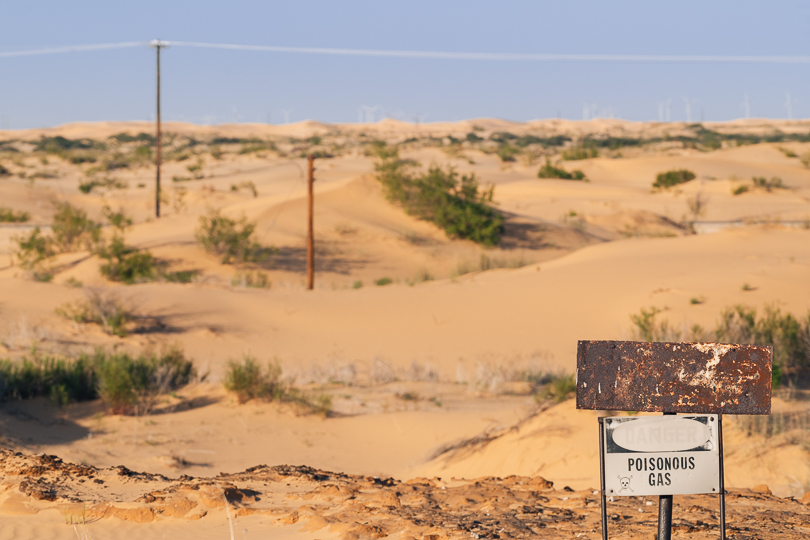
Signage alerting poison gas in the Monahans sand hills. Kermit, Texas. May 28, 2020. Credit: ©2020 Justin Hamel
“There are fewer federal worker safety inspectors than in the last two administrations, and state oil inspectors appear to give only superficial scrutiny to the sites, according to public records,” a major E&E News investigation this month found. “Between 2015 and 2019, the commission recorded 126,000 inspections statewide at sites with hydrogen sulfide permits. But in 96% of the inspections the inspectors simply verified whether warning signs and fences were in place, according to an E&E News analysis of state inspection data.”
The oilfields around Midland and Odessa now leak so much hydrogen sulfide gas that state air monitoring surveys found levels up to five times the legal limits during testing inside populated areas (though dramatically less H2S was present than can be found in the oil fields, where H2S levels can reach and exceed concentrations that kill people within minutes).
Flaring — or the burning off of natural gas right as it flows from an oil well — has also been a major problem in the Permian.
Sharon Wilson, an organizer with Earthworks, an environmental watchdog which tracks flaring, told DeSmog in early March that she’d been discovering an increasing number of unlit flares in the Permian, their emissions only visible via a specialized FLIR camera. Those unlit flares, sometimes called vents, spewed raw methane, a potent greenhouse gas, and volatile organic compounds like benzene directly into the atmosphere. In the first few months of 2020, she’d documented 61 sites where venting and flaring was underway, finding that 34 percent of the flares she encountered were unlit, up from 14 percent in 2017.
Recent research, based on satellite data and evidence from trace gases, corroborates concerns that venting and flaring are under-reported in Texas.
“In total, the volumes reported in the state database were only around half of what the satellite observed,” researcher Gunna W. Schade wrote in an article published today by the science news service Phys.org, adding that S&P Global also reported similar inconsistencies in New Mexico and North Dakota.
“These large differences may be explained by reporting errors and by several flare operations that are simply exempted from volume reporting,” Schade wrote. “But we suspect that there is an even more systemic, mundane explanation: venting—the direct release of raw gas to the atmosphere.”
‘We’re Okay Now. We’re Back. We’re Back.’
On Wednesday, during his campaign fundraiser in the Permian, Mr. Trump listed ways that his administration had tried to bolster the oil and gas business.
“Under the last administration, America’s energy industry was under relentless and unceasing attack,” he said. “But the day I took the Oath of Office, we ended the war on American energy and we stopped the far-left assault on American energy workers.”
“I withdrew from the one-sided, energy-destroying Paris Climate Accord,” he said. “We cancelled the Obama administration’s job-crushing Clean Power Plan. You know all about that. I approved the Keystone XL and the Dakota Access pipelines immediately upon assuming office.”
Mr. Trump told those gathered inside a white tent that over $1 billion in pandemic aid had flowed to the Texas energy industry’s workers. “Through the Paycheck Protection Program, we provided over $1 billion in emergency aid to keep Texas energy workers on the payroll,” he said. “We kept them all on the payroll.”
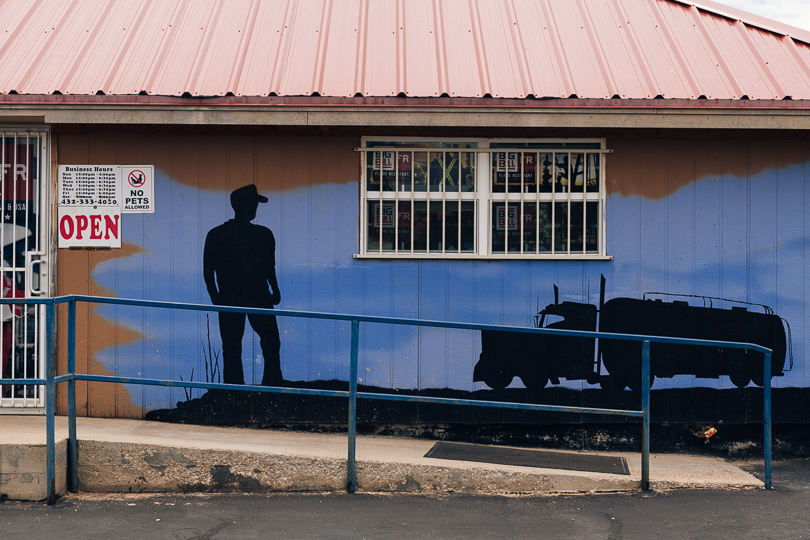
Oilfield services shop. Odessa, Texas. May 28, 2020. Credit: ©2020 Justin Hamel
Later, he told the crowd that in April, he’d struck a deal with Saudi Arabia, Russia, and other countries to cut their oil production and “got” them to “cut nearly 10 million barrels a day.”
“And I want to thank, frankly, Saudi Arabia. I want to thank Russia. I want to thank Mexico,” he said, adding that he wanted to thank OPEC+, in a speech the White House called “Remarks by President Trump on Restoring Energy Dominance in the Permian Basin.”
It’s not clear how much fruit all of the administration’s efforts to breathe life into the shale industry have borne.
Today, Bloomberg reported that OPEC+ is “days away from unleashing crude back onto the market following historic output cuts,” listing that as one reason oil prices today dipped back below $40 a barrel (another was Mr. Trump’s tweet signaling his support for delaying national elections in November).
Over 100,000 oil and gas jobs had been lost nationwide as of June, an analysis of federal data by Rystad Energy found. Last week the Houston Chronicle tallied 446 more lost jobs, warning of another 537 in danger due to their employers’ bankruptcies.
The oil industry’s struggles pale in comparison to the broader economy’s job losses, with the Commerce Department reporting today that the nation’s gross domestic product fell 9.5% in the second quarter and the Labor Department reporting the country’s 19th straight week of more than 1 million unemployment claim filings.
The impacts on Texas, which has also struggled to contain the virus, have been profound. The West Texas Food Bank has been distributing nearly 900,000 pounds of food each month since March, almost double what it gave out last year, the Wall Street Journal reported this month, adding that three quarters of the recipients were there for the very first time.
Those difficulties didn’t seem to touch Mr. Trump during his talk on Wednesday.
“We’re okay now,” Mr. Trump told the gathered oil industry representatives. “We’re back. We’re back.”
Main image: Laid off workers boots hung on fence posts after their last shift in the oil fields. Eddy County, New Mexico. May 27, 2020. Credit: ©2020 Justin Hamel
Subscribe to our newsletter
Stay up to date with DeSmog news and alerts


